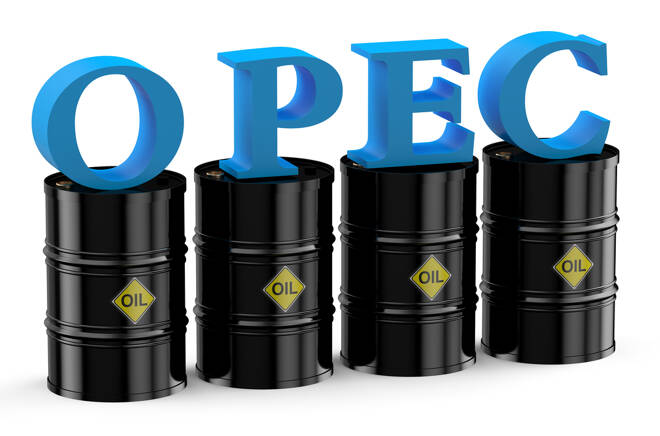Advertisement
Advertisement
Lack of Effective Market Strategy OPEC+ Increases Dissent. Price Pressure Building.
Updated: Dec 3, 2020, 08:24 GMT+00:00
Pressure on crude oil prices are again building up, as OPEC decided to postpone its meeting to Thursday due to internal dissent.
As already has been indicated the last days in the media, internal dissent inside of OPEC is building up, while the oil cartel also needs to get to grips with the fundamental distress in the market. Still, the optimism in the market, shown by a steep increase of oil prices the last weeks, is based on a very fragile fundamentals, while OPEC needs to decide on its production cut strategy. The success story of the OPEC+ production cut agreement, driven by Saudi Arabia, Russia and the UAE, is at present only a one-sided story.
Without any doubt has the current OPEC strategy been supporting the stability in the market, removing 7.7 million bpd from the market, but the effects on prices and revenues of oil producing countries has been minimal.
The two-sided sword approach of OPEC, being the market stabilizer and swing producer, has not been very positive for the government revenues of its respective member countries. Removing not only a vast volume of OPEC crude from the market, while hit by lower price settings, has become a real strain on internal financing and stability. While media has been looking at increased oil prices, the levels shown at present are not enough to even scratch the surface of price levels needed in the majority of OPEC+ countries to bring government budgets in the green again.
At the same time, OPEC+ strategies already from the start were a lopsided approach. By taking on the burden of vast production cuts, OPEC+ members such as Saudi Arabia, UAE or even Russia, were hit very hard, while other member countries were either non-compliant to the agreed production volumes or given exemptions, such as Libya and Iraq. OPEC member Venezuela and Iran have the whole time playing a different game, as they claim exemption status due to US sanctions, but addressing the market fully via third parties.
The internal burden-sharing discussion and need for higher oil prices to counter government budget deficits is now showing its ugly face. The delay, media sources and analysts are currently ‘blaming’ the UAE for the crisis situation, as the latter was vocal in its criticism about the strategy and internal compliance, but it should not be forgotten that a continuously growing amount of OPEC+ members is looking for success, but all are like frogs jumping in different directions. The extremely negative impact of COVID-19, global lockdowns, economic crisis and a lack of real short-term vaccines successes, is confronting OPEC+ with a non-manageable market situation.
Not used to a real global oil and gas market situation that is out of control, leaving OPEC+ members only to support reactive measures and strategies, is now forcing hard-needed discussions. OPEC leaders and Russia need partly to look in their own mirrors and admit that they have been not willing to acknowledge their own ostrich policies. By not admitting that the demand destruction and global economic crisis is not in their control, the market is still looking at them as the savior. Without very harsh production cut strategies, removing much more from the market than currently is being done no real change is possible.
At the same time, OPEC and Russia is facing a situation that there is a party in waiting, US shale and no-OPEC+ production, that will constrain any unilateral move of OPEC+. If production cuts are prolonged or even increased, global oil prices will go up. In the short run, hydrocarbon based revenues of governments and companies will increase, knowing however that every US dollar price increase will awaken some shale oil party in the US and entice all oil producing countries, including the majority of OPEC+ members, to open up their taps to reap some short-term and short sighted rewards.
The fatal attraction of the current more than 27% oil price increase, and the fata morgana of higher income and return to “normal” for most rentier states, seems too enticing to find comprises. Eagerness to cash in, get back to ‘normal’ and open up the taps, is more on the minds of producing countries than the willingness to stabilize.
The current perceived UAE lone-wolf strategy should be seen in this modus, Abu Dhabi doesn’t want to break up or leave the oil cartel. The fatigue of already over 2 years of crisis mode, exponentially increased due to the COVID-19 Black Swan event, is now showing. OPEC+ leaders are tired of taking on the burden, being hit by financial crisis scenarios and instability, while others are currently taking advantage. Hard choices will have to be made, not again just a roll-over of the current strategy. If nothing is going to change dramatically, the only victim will be the oil price.
Without change and real market control, prices are set to be much lower than currently is expected. Optimism is based on a possible Father Christmas Holy Season approach, but oil and price developments are not a fairy tale. COVID vaccines will not be changing markets before H2 2022, demand destruction is still ongoing with no real relief on the horizon. The only real fact is oil producers are not willing anymore to take the burden, taps are being oiled and ready to be open.
About the Author
Cyril Widdershovenauthor
Dr. Widdershoven is a veteran Energy market expert and holds several advisory positions at various international think-tanks and global Energy firms.
Advertisement
